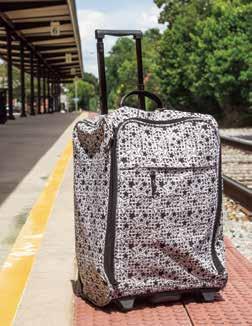
3 minute read
Bookshelf
September Books
FICTION
Advertisement
We Spread, by Iain Reid
Penny, an artist, has lived in the same apartment for decades, surrounded by the artifacts and keepsakes of her long life. She is resigned to the mundane rituals of old age, until things start to slip. Before her longtime partner passed away, provisions were made for a room in a unique long-term care residence, where Penny finds herself after one too many “incidents.” Initially, all is well. She even begins to paint again. But as the days start to blur together, Penny — with a growing sense of unrest and distrust — starts to lose her grip on the passage of time and on her place in the world. Is she succumbing to the subtly destructive effects of aging, or is she an unknowing participant in something more unsettling? Reid’s genredefying third novel explores questions of conformity, art, productivity, relationships and what, ultimately, it means to grow old.
If I Survive You, by Jonathan Escoffery
In the 1970s, Topper and Sanya flee to Miami as political violence consumes their native Kingston, Jamaica. But America, as the couple and their two children learn, is far from the Promised Land. The family pushes on through Hurricane Andrew and later the 2008 recession, living in a house so cursed that the pet fish launches itself out of its own tank rather than stay. Even as things fall apart, the family remains motivated by what their younger son, Trelawny, calls “the exquisite, racking compulsion to survive.” Masterfully constructed with heart and humor, the linked stories in If I Survive You center on Trelawny as he struggles to carve out a place for himself.
Lark Ascending, by Silas House
As fires devastate most of the United States, Lark and his family secure a place on a refugee boat headed to Ireland, the last country not yet overrun by extremists and rumored to be accepting American refugees. But Lark is the only one to survive the trip, and once ashore, he doesn’t find the safe haven he’d hoped for. As he runs for his life, Lark finds an abandoned dog, who becomes his closest companion, and a woman in search of her lost son. Together they form a makeshift family and attempt to reach Glendalough, a place they believe will offer protection. But can any community provide the safety that they seek? The Marsh Queen, by Virginia Hartman
Loni Murrow is an accomplished bird artist at the Smithsonian who loves her job. But when she receives a call from her younger brother summoning her back home to help their obstinate mother recover after an accident, Loni’s neat, contained life in Washington, D.C., is thrown into chaos. Going through her mother’s things, Loni uncovers scraps and snippets of a time in her life she would prefer to forget — a childhood marked by her father, Boyd’s, death by drowning. When Loni comes across a single, cryptic note from a stranger, she begins a dangerous quest to discover the truth about Boyd’s death. Pulled between worlds — her professional accomplishments in Washington, and the small town of her childhood — Loni must decide whether to delve beneath the surface into murky half-truths and either avenge the past or bury it, once and for all.
NONFICTION
One Hundred Saturdays, by Michael Frank
The remarkable story of 99-year-old Stella Levi, whose conversations with the writer Michael Frank over the course of six years bring to life the vibrant world of Jewish Rhodes, the deportation to Auschwitz that extinguished 90 percent of her community, and the resilience and wisdom of the woman who lived to tell the tale. With nearly a century of life behind her, Levi had never before spoken in detail about her past. Frank came to her Greenwich Village apartment one Saturday afternoon to ask her a question about the Juderia, the neighborhood in Rhodes where she’d grown up in a Jewish community that had thrived there for half a millennium. Neither of them could know this was the first of one hundred Saturdays that they would spend in each other’s company as Stella traveled back in time to conjure what it felt like to come of age on this legendary island in the eastern Aegean, which the Italians began governing as an official possession in 1923 and transformed over the next two decades until the Germans seized control and deported the entire Juderia to Auschwitz. Probing and courageous, candid and sly, Stella’s stories reveal what it was like to grow up in an extraordinary place in an extraordinary time. PS
Compiled by Kimberly Daniels Taws.










